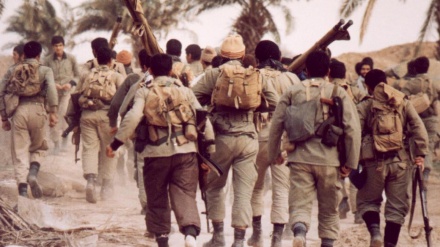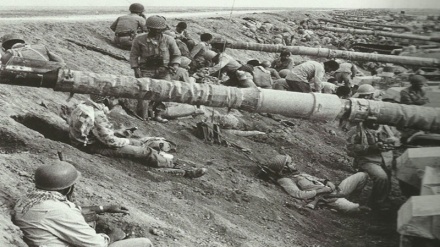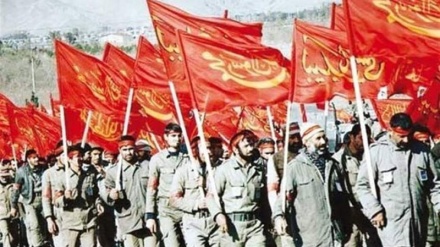Glimpses of Epic of 8-Year Holy Defense (15)
In the previous episode we talked about Saddam’s surprise attack on Iran’s territory with the aim of overthrowing the newly-established Islamic Republic system. Saddam began the all-out invasion of the Islamic Republic of Iran while the Islamic Republic was engaged in confronting conspiracies hatched by the foreign enemies and internal anti-revolutionary elements to stabilize the country’s political, military, security and economic organs after the overthrow of the monarchic regime.
Under such circumstances, popular movements were formed to confront Saddam regime’s invasion. One of these movements was the irregular war headquarters in Ahwaz by Dr. Mostafa Chamran who was Imam Khomeini's representative at the Supreme Defence Council and representative of Tehran people at the Islamic Consultative Assembly (Majlis). The leader of the Islamic Revolution Ayatollah Seyyed Ali Khamenei accompanied Dr. Chamran in creating and commanding headquarters of irregular wars. At that time, Ayatollah Khamenei was Imam Khomeini's representative at the Supreme Defence Council, Member of the Parliament (Majlis) and Tehran Friday prayer leader. The mission of headquarters of irregular wars was to organize and mobilize the scattered popular and military forces in the face of the Iraqi Ba'athist army through guerilla operations. For confronting an armed-to-the-teeth army, while being in shortage of forces and military equipment, guerilla operations were the only way for obstructing the advancement of Saddam's army. Chamran had correctly realized the necessity of guerrilla warfare against Saddam's aggressive army; and considering the experience he had in fighting the Zionist regime in Egypt, Lebanon and Syria, he formed the headquarters of irregular wars.
The Iraqi Ba'athist army had reached behind the gates of Ahwaz the largest and the most populous city of Khuzestan province. The collapse of Ahwaz could change many equations of the war and bring him close to his dream of conquering the entire Khuzestan.
Speaking on the initial days of forming the headquarters of irregular wars and resistance for stopping the advancement of the Iraqi Baathist army, Ayatollah Khamenei says: "We had only one brigade in front of the two and half Iraqi divisions in western Ahwaz, and that brigade was as strong as just a battalion! The Iraqis were afraid of this brigade. They approached nearly to 20 kilometers from Ahwaz, but why didn't they advance further? What were they afraid of? From a brigade that had been trenched and deployed there. It was a weak brigade with an actual potential of a battalion. When we went and saw it, we were really sad since our forces were a few in number. Now if I say how many tanks this brigade had, it will amaze every listener. A brigade with a poor potential in terms of equipment and personnel had indeed stymied two divisions."
In another part of his memoirs on the headquarters of irregular wars, Ayatollah Khamenei says: "They were afraid of that one brigade. We looked so many in their eyes; whereas our combatants consisted of small teams of 50 or 60 members composed of Basiji or IRGC forces or a mixture of Basiji, IRGC and sometimes military forces. They advanced, penetrated inside the enemy ranks in the heart of the enemy. It was really a sea of enemies, but our forces penetrated, struck, fired, and returned. This was because our combatants considered the enemy weak and dared to attack them."
The leader added: "This was an unseen help which I saw myself. This was really a divine favor. Of course I consider this divine favor to be the result of the faith of our forces. As I frequently said in Friday prayer, how our forces in trenches and in battle front fight the enemy with faith and sincerity in God. For sure, this was a divine favor.
Ayatollah Khamenei participated in direct battle with Saddam’s Ba'athist army and he was always ready for martyrdom. In part of his memoirs on the initial days of the war, the leader says: "I along with Dr. Chamran, went for reconnaissance in a region called Dobb-e Hardan which lies in western Ahwaz. This time we planned to go from the north, from the road which leads to Susangerd. There was a route in the middle of the road. We reached there. Our forces had deployed mortars. Since it was very important Dr. Chamran himself accepted to carry out the reconnaissance. I was also present. There were a group of combatants. We reached a point. They were divided into some groups to go from the right and the left and from the opposite side for reconnaissance. Those who went to the opposite side were upset saying that some Iraqi personnel carriers were coming there and they wanted to either identify or they were going to captivate us as they might have identified us. Dr. Chamran saw that their forces have no RPG weapons. He sent some RPGs. Then he could not calm down and said he was leaving. I also wanted to leave but he prevented me. He insisted on my stay until they turn back."
Describing the dangerous situation of reconnaissance, the leader of the Islamic revolution continues, "We were sitting with some of the guys. Of course we did not have RPGs but some personal weapons like J3 and Kalashnikov. We were waiting to see if they needed help. Then we would go and if they were back, we would also return. Meanwhile, we saw that we were surrounded by artillery shells. Incidentally, we were sitting under a tree. As it was hot we were sitting in the shade of the tree. They targeted the tree. We lay down for a while to have a shelter and then we saw that they continued shelling severely. We pulled ourselves quickly, they fired many artillery shells but we were not hit and it was really the favor of God that the shells did not hit us. As we were lying, mortar shells would hit around us. When we pulled back, we realized that the shell would have exactly fallen in the middle of us had we stayed in the tree's shade."
FK/RM/MG


